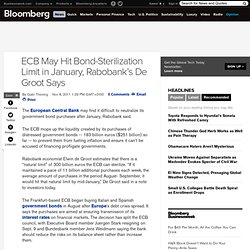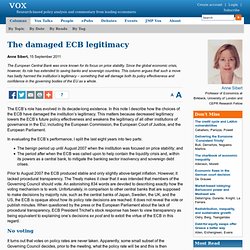

Banques centrales : poubelles du système financier mondial ? Comme nous l’écrivions dans l’article « retour sur les vraies origines de la crise », il sera toujours tentant pour les dirigeants politiques et économiques de demander à une banque centrale de payer leur gabegie, leurs inconséquences voire leurs incompétences.

Retour sur les vraies origines de la crise Plus de 4 ans après le début officiel, à l’heure ou tout le monde se demande comment on va sortir de cette interminable crise, revenons un instant sur les vraies origines. En effet ce type d’institution reste le prêteur en dernier ressort (pour sauver les banques en crise de liquidité) et l’acheteur en dernier ressort (pour sauver les états en crise de solvabilité et/ou de liquidité voire pour influer sur le prix de certains actifs financiers). Comme nous l’écrivions également, les banques centrales en général et la BCE en particulier vont devenir les poubelles du système financier international et des vraies bad banks en quelque sorte puisque l’on va profiter de leur double spécificité :
Pourquoi la BCE ne peut pas faire faillite. Un mythe court dans la presse économique et financière : si jamais la Banque centrale européenne venait à essuyer des pertes majeures dans le dédale de la crise de la dette, elle devra forcément être recapitalisée avec l’argent… des contribuables.

Cela n’aura échappé à personne, le bilan de la BCE gonfle à vue d’oeil depuis plusieurs mois, à mesure que la banque rachète des obligations souveraines, prête sans limites aux banques, entre autres opérations de rachats d’obligations dites « securisées ». Unlisted in euroland. Q&A: The ECB’s three-year loans. Joyeux Noël et bons baisers de la BCE. BCE: qu'est-ce la «normalité» pour une banque centrale?
Why the Euro Doomsayers Are Wrong. The economist Thomas Schelling began his 2005 Nobel Prize lecture with a famous declaration.

“The most spectacular event of the past half century is one that did not occur,” he said. “We have enjoyed 60 years without nuclear weapons exploded in anger [pdf].” The ECB is not here to save the world. ECB May Hit Bond Sterilization Limit in January, Rabobank Says. The European Central Bank may find it difficult to neutralize its government bond purchases after January, Rabobank said.

The ECB mops up the liquidity created by its purchases of distressed government bonds -- 183 billion euros ($251 billion) so far -- to prevent them from fueling inflation and ensure it can’t be accused of financing profligate governments. Rabobank economist Elwin de Groot estimates that there is a “natural limit” of 300 billion euros the ECB can sterilize. “If it maintained a pace of 11 billion additional purchases each week, the average amount of purchases in the period August- September, it would hit that natural limit by mid-January,” De Groot said in a note to investors today. What’s the hard limit to ECB hard money?
Explaining the ECB’s latest program. The ECB announced yesterday that it’s going to be throwing a bunch more cash at European banks.

No one knows how much it’ll end up being, exactly, but it’ll almost certainly be in the hundreds of billions of euros. The commentary on the decision, some of it very good, can get extremely technical extremely quickly. And so, at the request of Nick Rizzo, here’s a quick English-language explanation of what’s going on. At heart, what the ECB is doing is very simple: it’s lending money to European banks for 12 or 13 months at low interest rates. If you’re a European bank, that money is attractive, because many banks, especially ones on the European periphery, are finding it hard to borrow money these days.
This is not a bank recapitalization plan — it injects no new capital into Europe’s banks. But it’s a great relief to banks facing funding difficulties to be able to lock in one-year money at low rates. ECB has abandoned dependent banks plan - sources. The damaged ECB legitimacy. The European Central Bank was once known for its focus on price stability.

Since the global economic crisis, however, its role has extended to saving banks and sovereign countries. US funds show true state of eurozone banks. Greece forced to tap emergency fund. ECB collateral changes… ECB announces change in eligibility of debt instruments issued or guaranteed by the Greek government. The Governing Council of the European Central Bank (ECB) has decided to suspend the application of the minimum credit rating threshold in the collateral eligibility requirements for the purposes of the Eurosystem’s credit operations in the case of marketable debt instruments issued or guaranteed by the Greek government.

This suspension will be maintained until further notice. Emergency Liquidity Assistance. ECB austerity drive raises fears for democratic accountability in Europe. The EU's attempts to deal with the financial crisis by imposing austerity on member states will further alienate voters already disenchanted at the lack of accountability in Brussels and Frankfurt, leading European politicians and union leaders have warned.

In a succession of interventions aimed at appeasing markets and shoring up the balance sheets of eurozone countries, the European Central Bank (ECB) has demanded austerity policies in Greece, Portugal, Ireland and Italy, in the latter case even telling Silvio Berlusconi which measures must be instituted when and how. The Italian prime minister acquiesced, complaining that his administration was being made to look like "an occupied government". Antonio Di Pietro, a leading liberal MP, said: "Italy is under the tutelage of the EU, and a country under tutelage is not a free and democratic one. " FT reports: Siemens parked 4 to 6 bn euros at ECB - withdrew 500 million+ from either SocGen or Credit Agricole 2 weeks ago. Printer-friendly versionSend to friendPDF version FT reports that Siemens withdrew more than half-a-billion euros in cash deposits from a large French bank two weeks ago and transferred it to the European Central Bank, in a sign of how companies are seeking havens amid Europe’s sovereign debt crisis.

In total, Siemens has parked between €4bn ($5.4bn) and €6bn at the ECB’s facilities, mostly through one-week deposits, this person said. European Central Bank mounts rescue for Italy and Spain – but sets its price. The European Central Bank 's decision to start buying up Italian and Spanish bonds has controversially extended its operations into detailed demands for economic restructuring, it has emerged. Acting against the advice of Germany's Bundesbank, the ECB has been drawn into a role in the markets that had been intended for the eurozone governments' bailout fund, the European Financial Stability Facility (EFSF).
The ECB bond buying operation – which could reach €850bn (£740bn) according to analysts at RBS – has also transferred significant risk to the balance sheet of an organisation that has traditionally stuck to its remit of controlling inflation. Behind the scenes, moreover, it has begun to dictate – and in reportedly meticulous detail – the policies to be followed in one of Europe 's biggest economies. Before mounting the intervention that drove down Italian and Spanish borrowing costs on Monday, the ECB had spent some €75bn buying the debt of Greece, Ireland and Portugal. And why now? ECB: Statement by the President of the ECB. 1.

The Governing Council of the European Central Bank (ECB) welcomes the announcements made by the governments of Italy and Spain concerning new measures and reforms in the areas of fiscal and structural policies. The Governing Council considers a decisive and swift implementation by both governments as essential in order to substantially enhance the competitiveness and flexibility of their economies, and to rapidly reduce public deficits. 2. The Governing Council underlines the importance of the commitment of all Heads of State or Government to adhere strictly to the agreed fiscal targets, as reaffirmed at the euro area summit of 21 July 2011. A key element is also the enhancement of the growth potential of the economy. Could the ECB actually perform QE even if it wanted to? Given the stock market free fall and bond market turbulence we’re seeing, the question over whether the ECB could actually embark on an effective round of Quantitative Easing (QE) has become a pertinent one.
We’re not so sure it could (leaving aside the broader questions over how effective QE would be in any case [see US economy for details]). First off, any increase in the monetary base of the eurozone requires the approval of the ECB Governing Council (GC), whether it is in hard currency (directly printing money) or electronically creating money (how QE is usually done). The GC is made up of the ECB executive board and the heads of each eurozone national central bank (NCB). ECB announces change in eligibility of debt instruments issued or guaranteed by the Portuguese government. The Governing Council of the European Central Bank (ECB) has decided to suspend the application of the minimum credit rating threshold in the collateral eligibility requirements for the purposes of the Eurosystem’s credit operations in the case of marketable debt instruments issued or guaranteed by the Portuguese government.
This suspension will be maintained until further notice. ECB waives Irish sovereign ratings threshold. European Central Bank President Jean-Claude Trichet: A 'Quantum Leap' in Governance of the Euro Zone Is Needed - SPIEGEL ONLINE - News - International. BCE: "Super Mario" à la barre. Mario Draghi, l'homme ennuyeux le plus important du monde. Au cœur des discussions les plus animées des chefs d’Etat et de gouvernement européens, réunis à Bruxelles vendredi 24 juin, il y avait les émeutes à Athènes, les parlementaires indisciplinés à Berlin, la grogne des jeunes à Madrid. Et puis, sans doute, les crimes et délits sexuels à Rome. Mais les dirigeants européens ont tout de même trouvé un peu de temps pour entériner le choix du prochain locataire d’un modeste espace de bureaux dans le centre-ville de Francfort, en Allemagne. Mario Draghi, un économiste italien, propriétaire de beaux costumes taillés sur mesure, mais ayant bien peu de charisme évident, a bénéficié d’un soutien unanime pour succéder à Jean-Claude Trichet au poste de président de la Banque centrale européenne (BCE). publicité.
La Banque centrale européenne est-elle passée sous la coupe de Wall Street ? - Influence. Le 24 juin, les chefs d’État et de gouvernement européens ont officiellement nommé à la tête de la Banque centrale européenne (BCE) Mario Draghi, actuel gouverneur de la Banque d’Italie. Le 1er novembre, il deviendra ainsi le 3e président de la BCE, succédant à Jean-Claude Trichet, pour un mandat de huit ans. Une nomination qui fait grincer des dents. La politique obstinée de la BCE. L'erreur fatale de la Banque centrale européenne.
L'Allemagne a accepté la création de l'euro à condition que la monnaie unique soit aussi solide que le deutschemark qu'elle remplaçait. Ce qui impliquait que la Banque Centrale Européenne (BCE) soit, à l'instar de la Bundesbank, un organisme politiquement indépendant ayant comme principal objectif le maintien de la stabilité des prix. Pour atteindre cet objectif, la BCE a été dotée d'un instrument privilégié : le taux d'intérêt auquel se refinancent à court terme les établissements de crédit de la zone euro. Par ailleurs, le financement des Etats membres lui a été strictement interdit. Les conditions demandées par l'Allemagne ont été respectées jusqu'à ce qu'éclate la crise grecque. Dans les premiers mois de 2010, Athènes, n'arrivait plus à se financer sur les marchés.
Après avoir acheté des obligations souveraines pendant une année la BCE se trouve détenir aujourd'hui (d'après Open Europe, un think tank londonien) pour 190 milliards de dettes grecques. Grèce: la BCE fait obstruction à la démocratie. La BCE, donjon vacillant de l’Europe. Tandis que l'opinion publique s'acharne sur les grecs, le rôle, souvent oublié, de la Banque centrale européenne dans la gestion de la crise financière n'est pas inoffensif. BCE : le donjon du système. Billet invité. Fort à propos, la chancelière Angela Merkel vient d’avouer être impliquée dans « une multitude de discussions pour pouvoir envoyer un signal fort le 11 mars ». Why People Say "Eeh!" When They Learn About the ECB. With all the craziness at home, I didn’t have time to comment on the European Central Bank’s decision to raise rates despite continuing very high unemployment. The first thing to say is that overall eurozone numbers look very much like US numbers: a blip in headline inflation due to commodity prices, but low core inflation, and no sign of a wage-price spiral.
So the same arguments for continuing easy money at the Fed apply to the ECB. And the ECB is not making sense: it’s raising rates even as its official acknowledge that the rise in headline inflation is likely to be temporary. But there’s another, euro-specific aspect to this story. I was spared the need for chart-making by this very good post by Paul Mason, who gives us this: During the eurobubble years, there were huge capital flows to peripheral economies, leading to a sharp rise in their costs relative to Germany. The dark side of the ECB. Lots of people have been focusing on the recent ECB rate rise, but the ECB’s role in this crisis has really been determined by its other – more opaque and less publicised – role: as lender of last resort. This has got the ECB into a near untenable position. It faces huge exposure to peripheral eurozone countries, it aims to maintain price stability, but has also acted to stabilise the whole eurozone economy, and it has underwritten a bloated and inefficient banking sector with unlimited cheap money.
The ECB has lent massively to the struggling European banking sector. Although this may have been viable and necessary to halt the systemic risk from the financial crisis it is now out of control. It has propped up banks that should have gone bust and created banks addicted to ECB funding. ECB blues. The Open Europe team has spent a couple of weeks delved into the books of the European Central Bank. Trying to get to the bottom of what's actually on the ECB's books is a bit of a mission, given that the institution is so opaque that it would probably violate the EU's Transparency Directive on virtually every single point. In any case, last week we published a report cataloguing the exposure of the ECB to weaker eurozone economies.
We estimate that its exposure to Portugal, Ireland, Italy, Greece and Spain has now reached €444 billion - €190 billion of which is to Greece. Trichet Seen Burying Ailing Nations With Rate Rise on Inflation. Wellink says ECB should stop buying debt paper - report. Europe shouldn't pick at Ireland's bones. European Central Bank chief urges eurozone nations to cut budgets. European Central Bank 'doctrine' has turned markets into reality shows.
ECB dashes hopes as it refuses to pump extra money into eurozone. ECB tries to calm markets by promising unlimited liquidity. How far will the ECB go for the euro? Irlande : la BCE à la rescousse des banques - POLITIQUE ECONOMIQUE BANQUE. The ‘Banks Under Restructuring’ programme. FACTBOX-Banks' use of ECB lending facilities. ECB SMP looks suspiciously like QE - Journal - Money Moves Markets.